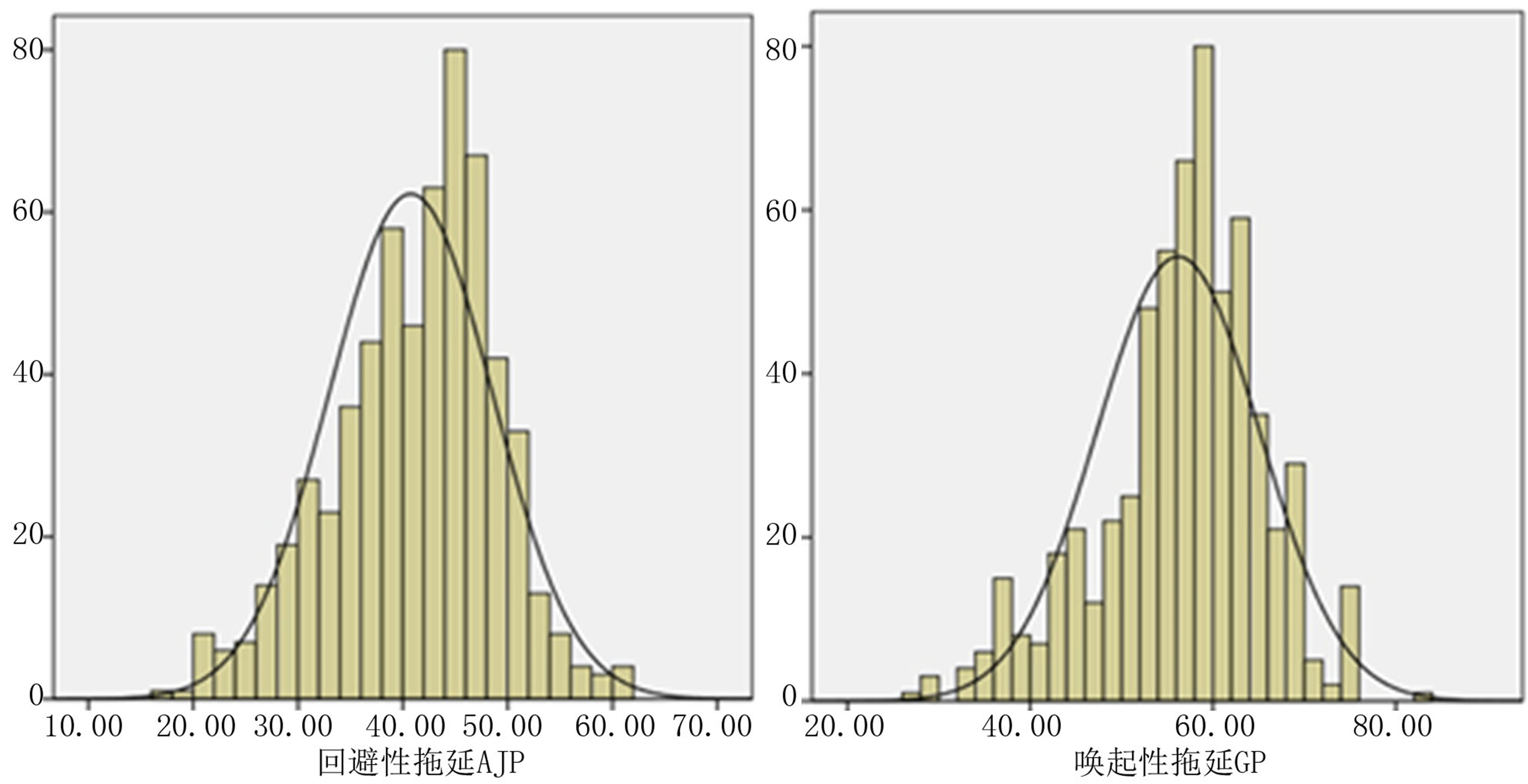1. 问题提出
现代社会的重要特征之一就是追求高效与快节奏,工作效率的高低直接影响了个人成就、组织业绩与社会利益的实现与否。然而,越来越多的个体却常常受到拖延的困扰。在心理学中,研究者们把个体不必要的、非理性地推迟目标任务的持续性、习惯化行为称为拖延。拖延处处可见,在大学生群体中更是普遍存在:上课迟到、考前突击、作业迟交等等行为几乎成了多数大学生的家常便饭。有研究(Ellis & Knaus, 1977)调查得出高达95%的大学生存在拖延行为。拖延行为一旦频繁持续发生,就会给个体带来一系列严重后果,它会导致大学生学业成绩下降、引发负面消极情绪、引发生理免疫系统下降,威胁着个体的身心健康。
大学阶段是人生观、价值观形成稳固的关键时期,在这个阶段他们需要认真思考人生态度、生存价值、未来的生活方式等一系列人生课题。拖延行为一旦持久发展,将会使他们形成不良的习惯,并在学习、生活中陷入恶性循环。深入研究探讨国内大学生的拖延行为的影响因素,并积极寻求解决拖延的办法具有深远意义。拖延行为造成了宝贵时间资源巨大的浪费,拖延的结果弊远远大于利。目前大学生中普遍存在的拖延行为导致学生回避困难、知难而退、不求进取,还会引发沮丧、焦虑等负面情绪,严重的更会伤及身心健康、导致学业荒废,学习成绩下降,人们不得不应该高度重视拖延引起的一系列负面影响。
未来时间洞察力对于拖延行为有深刻的影响,国内以黄希庭等学者的研究最具代表性,黄希庭(2004)认为:时间洞察力是能力特质,也是动力特质。因为个体感知时间、理解时间价值、把握当前时机、管理时间等皆存在着能力上的差异;个体对时间的情操(如责任感、荣誉感)、自我的监控、理想的追求等也存在动机上的差异。时间洞察力的这种能力和动力特质存在着稳定的个体差异,它深刻的影响着个体的生活质量,决定着个人事业人生的成功。黄希庭从时间认知的角度提出了关于未来时间心理结构的分段综合模型,他认为未来时间洞察力不仅包含认知和情感成分,也包含了行为或行动倾向成分。黄希庭(2004)的研究中提到,对于未来而言,成功与失败者之间的最主要区别,在于成功者敢于追求卓越超群的未来目标,采取具体措施,脚踏实地地从现在做起,用自己的努力来创造未来,而不是安于现状的宿命态度和及时享乐的无所作为。苏毓婧(2008)采用一般未来时间洞察力量表研究了大学生的未来时间洞察力与学业拖延的关系,研究结果显示大学生的未来时间洞察力越强,表现出来的学业拖延就会越少。王孟成等人(2009)采用Aitken拖延行为问卷和青少年时间透视量表对456名大学生和研究生进行测试,研究发现拖延与未来时间透视分量表的态度、指向性和清晰度因子存在显著负相关,与长度因子存在显著的正相关。
本研究以大学生为研究对象,旨在揭示未来时间洞察力作为稳定的人格特征对拖延行为的影响,从而为后续的干预研究提供理论基础。
2. 研究方法
2.1. 研究对象
本研究采用分层整群抽样的方法,分别于2013年10月、11月期间分别在重庆大学、安西南大学、宜宾学院三所本科院校;重庆工业职业技术学院、重庆电子工程技术学院两所专科院校共发放问卷700份,回收问卷668份,剔除无效问卷后剩余的有效问卷为607份,有效率为90.9%,被试的具体分布情况如表1所示。
2.2. 研究工具
2.2.1. 拖延量表
1) 唤起性拖延量表
唤起性拖延量表又叫雷氏一般拖延量表(General Procrastination Scale, GPS),是由Lay于1986年编制,它是单因素结构量表,一共有20个项目,内容囊括了与拖延相关的学业活动、日常生活行为,比如“我总是推迟必须要做的工作”、“外出时,我总是提前做好准备”等。该量表采用了Likert5点式评分法,从“根本不符合”到“非常符合”分别为1分和5分。具有良好的内部一致性信度和再测信度。研究表明(薛玲玲,关雪菁,2005)此问卷在我国大学生中有着良好的适用性。本研究中该量表的内部一致性系数Cronbach’s α为0.733,符合测量的基本标准。
2) 回避性拖延量表
回避性拖延量表又叫成人拖延量表(Adult Inventory of Procrastination Scale, AIP),由McCown和Johnson在1989年编制,是单因素结构量表,一共有15个项目。内容包括“我发现我的行动总是跟不上

Table 1. The specific distribution of subjects (N = 607)
表1. 被试的具体分布情况(N = 607)
计划”,“我总是不能按时完成任务”等。该量表同样采用Likert5点式评分法,从“根本不符合”到“非常符合”分别为1分和5分。本研究中该量表的内部一致性系数Cronbach’s α为0.747,符合信度指标测量标准。
2.2.2. 一般未来时间洞察力量表
一般未来时间洞察力量表是宋其争于2004年编制。量表由五个因子组成:未来意象、目的意识、未来效能、远目标定向、行为承诺。一般未来时间洞察力量表共20个题目,考察了个体一般未来时间洞察力的认知成分(未来意象和目的意识)、情感体验(未来效能和远目标定向)以及行为倾向(行为承诺)。量表采用了5点计分法,从1至5分代表了从完全不符合到完全符合。各维度的项目均值得分大小代表了相应维度的时间洞察力的强弱。宋其争(2004)使用该量表对329名大学生被试进行了测量,他对该问卷的信度和效度进行检验,得出内部一致性系数为0.896,重测信度为0.793,本研究中该量表的内部一致性系数Cronbach’s α为0.820,符合测量标准。
2.3. 施测程序
本研究采用集体施测的方式,将一般未来时间洞察力量表、唤起性及回避性拖延量表制成一张问卷,以班级为单位进行发放。测试前先由主试(心理学研究生)宣读统一的指导语和注意事项,整个测试的时间大约20分钟,学生根据自己的具体情况匿名作答,所有被试均为知情同意。
2.4. 数据处理
本研究使用SPSS l8.0进行数据处理,统计方法有描述性统计、单因素方差分析、相关分析。
3. 研究结果
3.1. 大学生拖延行为与未来时间洞察力的总体概况
3.1.1. 大学生拖延行为的总体状况
对被试大学生群体在唤起性和回避性两个拖延量表的得分情况做描述性统计分析,结果如表2所示。
表2和图1的结果显示:唤起性拖延量表和回避性拖延量表的平均值分别为2.81和2.72,略小于量表中间值3,可见大学生拖延总体现状不太严重。从两类拖延得分的频率直方图可以看出,虽然绝大多数学生的拖延水平较低,但是仍然有许多学生依然受到拖延的困扰。
3.1.2. 大学生未来时间洞察力的总体现状
对未来时间洞察力总分及各维度的得分描述统计的结果如表3。
表3的结果显示:从整体水平看,大学生未来时间洞察力每题得分的均值为2.76,高于五点量表的中等水平2.5之上。可见大学生未来时间洞察力处于较高水平。大学生未来时间洞察力各维度上的得分自高到低依次为:未来意象、未来效能、目的意识、远目标定向、行为承诺。各维度得分均处于中等水平2.5分之上。
3.2. 大学生拖延行为与未来时间洞察力的差异检验
3.2.1. 性别差异检验
不同性别的大学生在拖延两个量表、未来时间洞察力总量表和各分量表的得分分布及差异检验结果如表4。
表4的结果显示:在唤起性拖延和回避性拖延上,女生均高于男生,并且存在显著差异。大学生在

Table 2. The score of both procrastination scale
表2. 大学生拖延两个量表得分情况

Table 3. The score of FTP scale/sub-scales
表3. 大学生未来时间洞察力及各维度得分情况

Figure 1. The frequency histogram of college student on both procrastination scale
图1. 大学生在两种拖延类型上得分的分布频率直方图
未来时间洞察力总分和各个维度上,男生均略高于女生,并且在未来时间洞察力总分及未来意象上差异显著。
3.2.2. 学校类型差异检验
不同学校类型的大学生在拖延两个量表、未来时间洞察力总量表和各分量表的得分分布及差异检验结果如表5。
表5的结果显示:在唤起性拖延和回避性拖延上,专科生均高于本科生,在回避性拖延上存在显著差异。大学生在未来时间洞察力总分和各个维度上,本科生均略高于专科生,并且在未来时间洞察力及

Table 4. The independent-samples t-test of variables on sexes
表4. 各变量在性别差异上的独立样本t检验
注:*P < 0.05;**P < 0.01;***P < 0.001。

Table 5. The independent-samples t-test of variables on school types
表5. 各变量在学校类型差异上的独立样本t检验
注:*P < 0.05;**P < 0.01;***P < 0.001。
其维度未来意象、未来效能、远目标定向上差异显著。
3.2.3. 专业差异检验
不同专业的大学生在拖延两个量表、未来时间洞察力总量表和各分量表的得分分布及差异检验结果如表6。
表6的结果显示:在唤起性拖延和回避性拖延上,文史类均高于理工类,并且在回避性拖延上差异显著。文史类的大学生未来时间洞察力不如理工类的大学生高,但差异不显著;在其各个维度上,理工类大学生在未来意象、未来效能、远目标定向、行为承诺上均高于文史类大学生,但只有在未来意象上差异显著。
3.2.4. 生源地差异检验
不同生源地的大学生在拖延两个量表、未来时间洞察力总量表和各分量表的得分分布及差异检验结果如表7。
表7的结果显示:在唤起性拖延和回避性拖延上,来自城镇的大学生得分均高于来自农村的大学生,并且都存在显著差异。来自城镇的大学生在未来时间洞察力总分、未来意象、远目标定向、和行为承诺上低来自农村的大学生;在目的意识和未来效能维度上高于农村大学生,表中显示只有远目标定向这一维度差异显著。
3.3. 大学生拖延行为与未来时间洞察力的关系
采用SPSS18.0对本研究的两个问卷进行相关分析,从表8可以看出,大学生拖延行为问卷与未来时间洞察力问卷相关,相关达到显著水平,即拖延行为与未来时间洞察力呈负相关。问卷的各个维度也达到显著水平。
从表8结果可知:拖延行为及其两个维度与时间洞察力存在相关关系,即显著负相关,也就是说,个体的未来时间洞察力水平越高,那么他在生活、学习中的拖延行为就越少。

Table 6. The independent-samples t-test of variables on major types
表6. 各变量在专业差异上的独立样本t检验
注:*P < 0.05;**P < 0.01;***P < 0.001。

Table 7. The independent-samples t-test of variables on origin of students
表7. 各变量在生源地差异上的独立样本t检验
注:*P < 0.05;**P < 0.01;***P < 0.001。
4. 讨论
4.1. 关于总体状况的讨论
从总体上看,大学生拖延现象并不太不严重。数据显示,唤起性拖延量表和回避性拖延量表的平均分分别为2.81和2.72,略小于量表中间值3,但依然有15%的小部分群体受到拖延的困扰。这与国内很多学者的研究相一致(甘良梅,2007;石轶,2009;申雨凡,2012),从文献上来看,国内的拖延现状没有国外报告的那么严重,可能是因为国内外大学生所处环境、生活方式、学习方法不同导致,另外,国内大学生从小接受的教育模式更加规律和严格,进入大学多数学生仍能保持这种良好的习惯。亦或国内大学生更注意自身形象,在回答问卷时有隐瞒的现象。
在未来时间洞察力上,大学生在未来时间洞察力总分及各维度上的得分皆高于中间值。这与任磊(2010)的研究结果一致。说明大学生具有较好的未来时间洞察力,能够意识到毕业后的就业压力,在学校期间就能关注自己长远的发展,对自己的未来有比较清晰的规划和认识。具体到各维度上,未来意向、未来效能、目的意识、远目标定向和行为承诺得分均较高。有一项关于大学生“如何实现既定的目标”的开放性研究(许艳杰,2008),大学生提及的方法或手段次数前五位的依次是脚踏实地努力(12.8%)、机遇(7.7%)、依靠人脉、人际关系(6.2%)、选择考研(3.6%),凭借才能(1.5%)。这说明了大学生群体能够意识到应该依靠自身的能力和资源,并且付出实际行动为自己的目标努力奋斗,才有可能得到期待中的结果。
4.2. 关于差异分析的讨论
4.2.1. 性别差异
在唤起性和回避性两类拖延上,女生的得分均显著高于男生,这说明女生比男生更容易产生拖延行为。男女在拖延现象上的差异可能是因为家庭对他们不同的教育方式造成,对女生较为宠爱娇惯,容易造成女生拖延习惯的养成。这于以往拖延行为性别差异的研究结论并不一致,如Ferrari(1995)、Iakender (2009)、赵侠(2008)认为拖延行为并不存在显著的性别差异,而Steel(2007)、韩贵宁(2008)的研究则认为男生的拖延行为显著高于女生。这种不一致可能是由于文化背景、被试群体、测量工具的差异造成的。
男生在未来时间洞察力的总分上得分显著大于女生,这与许艳杰(2009)、覃开意(2006)的研究结果一致。未来时间洞察力是个体对未来“我”的预期,指向个体可能的自我。大学生虽然尚未迈出校园,但是严峻的就业压力还是影响着他们对未来的期待和评价。男生实际获得工作的机会要大于女生,可能因为如此,使得男生比女生更属于“乐天派”,更倾向于认为明天会更好或者自己有能力让未来更美好。在各个维度上,性别在行为承诺、未来效能、远目标定向和目的意识四个因子上没有显著差异,但是在未来意向上男生的得分显著高于女生。说明男生把目光放的更长远,对未来的期望更感兴趣。
4.2.2. 学校类型差异
专科生在唤起性拖延和回避性拖延上的得分均大于本科生,后者差异显著。本科生面对的学业任务

Table 8. Correlation analysis of questionnaire on each dimensions
表8. 问卷各维度的相关分析
要比专科生重,学习需要更高的自主性,压力也比专科生高,加之专科学校的管理相对要比本科学校宽松,这些可能是导致专科生拖延现象高于本科生的原因。
未来时间洞察力的总分和未来效能、远目标定向、未来意向的学校类型主效应显著,本科学生得分显著高于本科生。这与许艳杰(2008)的研究结果有出入。专科生在生活和学习上可能不太能严格要求自己,加上父母施加的压力可能更大,所以专科生对未来的信心不足。相反本科生比专科生学业成绩好,对自身的要求比较高,目前面对社会上诸多工作机会,学历依旧是个“敲门砖”。本科生的薪金和社会地位要高于专科生,这也使得本科生更愿意畅想未来、更愿意设立长远的目标。
4.2.3. 专业差异
文史类大学生在唤起性拖延和回避性拖延上的得分均大于理工类学生,后者差异显著。这与已有研究相似(蒙茜,2007)。这可能因为理工类大学生更擅长于逻辑思维,做事更有条理计划;与此同时,文史类大学生就比较自由烂漫,不太喜欢被束缚,在具体的任务执行上的速度效率就要慢的多。还可能由专业学科的不同培养方式造成。
在未来时间洞察力的专业差异上,理工类的大学生除了在目的意识维度上得分略低于文史类学生外,未来时间洞察力总分和其余维度的得分均高于文史类学生,在未来意向维度,专业主效应显著。说明理工类大学生更为积极主动地对待未来,对未来的设想也更多。未来意向总归是要建立在现实的基础上,所以会受当下的认知、情感的影响.众所周知,目前从总体来看,理工类学生在工作选择、薪酬待遇等方面都会优于文史类学生,这就使得在校的理工类大学生有更高的自我认同感,他们更愿意主动去相信和想象美好的未来。
4.2.4. 生源地差异
来自农村的大学生在唤起性拖延和回避性拖延上的得分均小于来自城镇的大学生,两者皆为差异显著,这与赵婉黎(2007)的研究结论一致。俗话说,农村的孩子早当家。来自农村的大学生虽然生活物质条件没有城镇的大学生丰富,但在上大学前他们可能已经早早的承担起家里部分家务、减轻家里的负担,比起城镇大学生他们的时间观念更强,更懂得时间的珍贵,能在学习和生活中合理的安排时间,于是拖延行为没有城镇大学生严重。
来自农村的大学生在未来时间洞察力总分、行为承诺、远目标定向、未来意向得分高于来自城市的大学生。知识改变命运,来自农村的大学生认为考上大学是较好的出路,他们对自己的未来有着更清楚且真实的认识。考上大学让他们对未来的生活有所期待和寄托。来自农村的大学生未来效能维度得分更低,也说明了他们对未来的情感体验不高,这是受到我国的大环境影响,很多大中城市尤其是发达城市,很多工作机会都有户口的限制,这使得来自农村的大学生更加相信自己,愿意依靠自己的能力积极主动的采取行动。
4.3. 关于相互关系的讨论
首先,相关分析表明未来时间洞察力总分及各维度与唤起性、回避性两类拖延行为之间都存在显著负相关。也就是说,个体的未来时间洞察力水平越高,那么他在生活、学习中的拖延行为就越少。这与的苏毓婧(2010)研究结果一致。
拖延与过去时间洞察力呈正相关,与未来时间洞察力呈负相关。拖延者还有以下特点:消极的看待过去,宿命的看待现在,很少关注未来。国外在这方面的研究较多,但是国内的相关研究较少,而且没有对拖延行为进行过分类研究,这是国内研究的空缺。
未来意象、目的意识和行为承诺能负向预测两类拖延行为。未来时间洞察力主要体现为个体对自我发展可能性的认知。未来意象和目的意识维度属于未来时间洞察力的认知成分。未来意象和目的意识强的大学生更能洞悉近的、远的未来事件或任务对自己的意义,他们更关注自身未来的发展,对未来有比较清晰的认识,对未来生活充满期望,能主动地创造自己的未来。因而不易出现拖延行为。行为承诺属于未来时间洞察力的行为倾向,行为承诺水平高的大学生愿意为实现自己设定的目标或理想付诸于实际行动,他们为了更好的发展愿意付出更多的努力学习,从而较少出现拖延行为。以往有研究(苏毓婧,2010)指出拖延行为与未来取向呈显著负相关,也就是说个体拖延程度越高,他未来取向的程度就越低。
未来时间洞察力水平高的学生对未来会有长远的规划,对目标的实现更有信心。胡霞等人(2007)认为未来时间洞察力可以增强行为的坚持性。Simons, Dewitte和Lens(2000)的研究发现,对未来目标的关注度越高,就越能够坚持学习,并能获得更好的学习成绩。所以未来时间洞察力强的学生,在面对困难时候就更能持之以恒,不会轻言放弃,坚持朝着自己的目标前进,所以他们在学习中很少拖延。李董平等人(2008)的研究显示,未来时间洞察力及各因子均与大学生学习适应有显著的正相关,所以大学生的未来时间洞察力越强,学习适应性就越好,就会很少出现拖延行为。低未来时间洞察力的学生会缺乏清晰的长远规划,对未来不太乐观,不会为实现目标而去努力奋斗,当他们在生活学习中遇到问题和困难时就很容易逃避、退缩,适应能力较差,从而导致拖延行为。
5. 研究建议
拖延者习惯于用能力衡量自我价值,他们视能力为稳定特质,认为任何事情的成败都反映了个体的能力。拖延者不相信自己的能力、在任务面前会使用回避、拖延等自我妨碍的行为来保护自我价值。因此,需要帮助并引导学生意识到自我价值的实现是可以是多样的,对个体的评价也应该通过不同的角度,而不该仅仅禁锢于学业成绩等某个方面。当学生们意识到这一点时,就可以避免回避行为、摆脱各种消极情绪。同时还需要培养学生的能力发展观,让学生意识到能力的可变、可培养、可塑造性。事情的成功与失败都可以增强自己的能力。
未来时间洞察力作为个体对未来的人格特点,主要是对自我发展可能性的认知、情感体验和行为倾向,未来时间洞察力在大学阶段形成并不断发展、稳固。可以从本研究中得出拖延行为总是和低未来时间洞察力水平的个体相联系,因而加强并培养大学生的未来时间洞察力水平显得十分重要。首先就未来时间洞察力的认知成分而言,大学生越关注自己未来的发展,对未来的自己越有较为清晰的认识,预想的未来事件越多,其产生拖延行为的可能性就越小;其次就情绪体验而言,大学生越认为自己有能力建造美好的明天,越能为自己设定更高、更多的未来目标,其拖延行为也就越少;最后就行为倾向而言,大学生愿意为实现自己设定的目标而付诸于实际行动的倾向越高,那么所产生的拖延越少。目前大学生中不乏许多没有自信、缺乏目标、得过且过,或是对未来有着不切实际的幻想的个体。教育者应该加强大学生未来观、危机意识的教育,使学生在近的、远的未来皆有清晰可行的目标,培养、引导和训练大学生职业生涯的规划,让他们发掘自我潜能、增强个人实力,在立足于当下的基础上为自己的目标不懈奋斗。